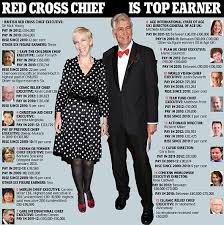I’ve pointed out before that there are about 180,281 charities in England and Wales with over 800,000 employees and 945,278 trustees. Of course, many of these charities are tiny and some will not even have any employees. But how many people do we need donating money to keep the bosses of the larger charities in the comfort to which they believe they are entitled?
Let’s assume that of the people running Britain’s 180,281 charities,�only 2,000 executives earn over �100,000 a year (I suspect there are more than this). That gives a salary bill of an incredible �200,000,000 a year (�16,700,000 a month).
Let’s also assume there are around 20,000 charity bosses and managers in the �50,000 to �100,000 salary range. On an average salary of say �65,000 a year, that gives us another �1,300,000,000 a year (�108,000,000 a month).
Added together, this gives us a salary bill for the bosses of Britain’s larger charities of �1.5bn a year (�125,000,000 a month). That is an awful lot of money being taken from people donating and going straight into charity bosses’ bank accounts.
Now, let’s play one more game with the numbers. Many charities try to recruit us by only asking for small sums like �2 per month or �5 per month or even �10 per month. So, if we’re donating on average �5 per month, we’d need 25,000,000 people donating just to pay the salaries of charity bosses. If we’re donating on� average �10 per month , then we “only” need 12,500,000 people donating to support our charity bosses (click to see� cartoon clearly)
I know that many larger charities get much of their money from government and not just ordinary people’s donations.�But government money is our money that we pay in taxes.�Anyway, the purpose of my estimates is to try to expose the incredible number of donors that would be required just to pay the salaries and pensions of charity bosses and senior managers.
The Charity Commission (regulator for charities in England and Wales) claims that over 80% of the money we donate goes to “charitable expenditure”. But “charitable expenditure” includes the salaries of charity employees, especially bosses. Oxfam, for example spends �101.8m of the �385.5m it raises on salaries and pensions for its staff. Many charities spend around half their income on staff salaries and pensions (Centrepoint, for example).
So, there you have it. A very rough, back-of-a-fag-packet�calculation, I admit. But as far as I can see, the salaries of the bosses at our larger charities would consume the monthly donations of between 12,500,000 and 25,000,000 generous (but stupid?) people.
Anybody feel like donating to Oxfam (3 bosses on over �100,000 a year and 32 more on over �60,000 a year) or Save the Children (8 bosses on over �100,000 a year and 23 more on over �60,000 a year) or even the much smaller Centrepoint Rooms for the Homeless which took a full-page ad in the latest edition of Private Eye (1 boss on over �100,000 a year and�4 more on over �60,000 a year and with an annual salary and pension cost per employee of over �35,000)�now?
It seems to me that the Charity Commission should set a maximum salary for a charity boss of say �60,000. If the greedy placemen and placewomen, who seem to be appointed by their political cronies to run many of our charities, want more they can get a proper job.
(Tomorrow – time to have a go at pointless, whining, self-absorbed�non-entity Prince Charles)

















Some scary figures here. Any chance of an article on Common Purpose?
[…] – som en �gte nyttig idiotisk venstreorienteret organisation – kan ikke lide Israel. Derfor forlangte de at Scarlett Johansson, som en af […]
The Big Con!
High-profile charities now work as business, rewarding their personnel through extravagant salaries in proportion to money they extort from the general pubic by appealing to our sympathies and better natures. Highly paid charity executives are therefore nothing better than well-heeled, proxy beggars.
Thus, those persuaded to part with their hard-earned cash are in effect entering into a voluntary taxation system in which the charity executives may be seen as well paid tax collectors.
[…] one thing levels. With this in thoughts before setting […]
The Charity Navigator (which was mentioned aldreay) is a good start. Also try some of the finance magazines like Money and Kiplingers. They rate each charity by amount spent on admin vs the actual charity purposes.References :